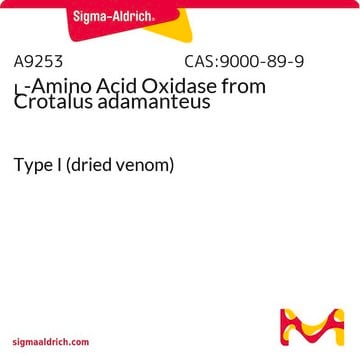F7296
Fructosyl-Amino Acid Oxidase from Corynebacterium sp.
recombinant, expressed in E. coli, lyophilized powder, ≥0.45 units/mg protein
Autenticatiper visualizzare i prezzi riservati alla tua organizzazione & contrattuali
About This Item
Classificazione EC (Enzyme Commission):
1.5.3.x
Numero CE:
Numero MDL:
Codice UNSPSC:
12352204
NACRES:
NA.54
Prodotti consigliati
Ricombinante
expressed in E. coli
Forma fisica
lyophilized powder
Attività specifica
≥0.45 units/mg protein
PM
~88 kDa by electrophoresis
Temperatura di conservazione
−20°C
Descrizione generale
Fructosyl amino acid oxidase [fructosyl-a-l-amino acid:oxygen oxidoreductase] is a flavoprotein that catalyzes the oxidation of fructosyl amino acids to form glucosone, amino acid and hydrogen peroxide.
Enzyme Commission (E.C.) 1.5.3.x
Applicazioni
Fructosyl-Amino Acid Oxidase from Corynebacterium sp has been used in glycated haemoglobin HbA1c detection in blood samples using quartz crystal microbalance (QCM) based detection.
Fructosyl-amino acid oxidase can be used to detect the levels of glycated proteins, which are markers for diabetes mellitus.
Azioni biochim/fisiol
Fructosamines are formed when glucose is condensed amino group of amino acids or proteins. Fructosamine oxidases (FAOX) catalyze the oxidative deglycation of low molecular weight fructosamines. Fructosyl amino acid oxidase catalyzes the oxidation of the C-N bond linking the C1 of the fructosyl moiety and the nitrogen of the amino group of fructosyl amino acids.
Fructosyl-Amino Acid Oxidase (FAOD) comprises of FAD-binding motifs and is classified into three types based on substrate specificity. The engineered Corynebacterium Fructosyl-Amino Acid Oxidase is stable at 45°C and could be exploited for the development of glycated protein biosensing system and glycated hemoglobin HbA1c measurements. FAOD shares sequence homology with fructosyl peptide oxidase and both are effective on α-fructosyl substrates.
Suitable for the determination of fructosyl-L-amino acid.
Definizione di unità
One unit will produce 1.0 μmole of hydrogen peroxide per minute at pH 8.0 at 37 °C.
Codice della classe di stoccaggio
11 - Combustible Solids
Classe di pericolosità dell'acqua (WGK)
WGK 3
Punto d’infiammabilità (°F)
Not applicable
Punto d’infiammabilità (°C)
Not applicable
Dispositivi di protezione individuale
Eyeshields, Gloves, type N95 (US)
Certificati d'analisi (COA)
Cerca il Certificati d'analisi (COA) digitando il numero di lotto/batch corrispondente. I numeri di lotto o di batch sono stampati sull'etichetta dei prodotti dopo la parola ‘Lotto’ o ‘Batch’.
Possiedi già questo prodotto?
I documenti relativi ai prodotti acquistati recentemente sono disponibili nell’Archivio dei documenti.
I clienti hanno visto anche
A quartz crystal microbalance-based biosensor for enzymatic detection of hemoglobin A1c in whole blood
Park HJ and Lee SS
Sensors and Actuators B, Chemical, 258, 836-840 (2018)
R Romero Campos et al.
Angiologia, 43(3), 130-131 (1991-05-01)
Authors report the case of a young man affected by an aneurysm at the humeral artery. The relevance of this case was due to its notable rare incidence at such level as well as its difficult etiologic diagnosis. Patient was
C Gerhardinger et al.
The Journal of biological chemistry, 270(1), 218-224 (1995-01-06)
A Pseudomonas sp. soil strain, selected for its ability to grow on epsilon-(1-deoxyfructosyl) aminocaproic acid, was induced to express a membrane-bound enzymatic activity which oxidatively degrades Amadori products into free fructosamine. Apparent Km values for fructosyl aminocaproate, epsilon-fructosyl lysine, fructosyl
Structural basis of the substrate specificity of the FPOD/FAOD family revealed by fructosyl peptide oxidase from Eupenicillium terrenum
Gan W, et al.
Acta Crystallographica. Section F, Structural Biology Communications, 71(4), 381-387 (2015)
Y Sakai et al.
FEBS letters, 459(2), 233-237 (1999-10-13)
A high-level production of fructosyl amino acid oxidase (FAOD), whose production was toxic in Escherichia coli, was investigated through attempts to utilize the peroxisome of Candida boidinii as the place for protein accumulation. The alcohol oxidase-depleted strain (strain aod1Delta) produced
Il team dei nostri ricercatori vanta grande esperienza in tutte le aree della ricerca quali Life Science, scienza dei materiali, sintesi chimica, cromatografia, discipline analitiche, ecc..
Contatta l'Assistenza Tecnica.










